Lucy Ovenden – 6 July, 2018
Plastic objects frozen into still life appear like treasures, touched by Hartley-Skudder's ability to make the everyday seem unattainably luxurious. Combinations of swizzle sticks, bottles, perfumes, soap dishes, egg timers and nail brushes are colour-coordinated to match the sinks and ceramic tiles on which they sit. These delicate paintings complete the showroom's sales pitch, advertising the type of perfect home one could have, if they simply purchase this hand basin.
Neatly installed along the walls of both gallery spaces are 1950s bathroom hand basins, some attached to the wall and some with pedestals. Colour-coordinated ceramic tiles have been collected and laid as full sized splash backs by the artist, while the sinks appear to be plumbed-in and ready for use. Each scene is accompanied by an intricate oil painting in a pastel frame. From the delicate brushwork to the feminine palate to the faux-luxurious plastic objects assembled into still life, Emily Hartley-Skudder’s works inform a discussion about women’s lives and the rise and fall of plastic in society past and present.
Blue Rinse is Hartley-Skudder‘s first solo exhibition in Christchurch since presenting Showhome in an off-the-plan house in Wigram Skies, as a Christchurch Art Gallery Outer Spaces Project in 2013. Over the past five years Hartley-Skudder has created her own pastel Pleasantville. Her work nods towards Surrealism as she distorts the conception of the ideal home through the manipulation of light and shadows, creating illusions complete with dollhouse miniatures and a seemingly endless supply of retro trinkets.
Blue Rinse, however, is a scaled up version of what we have come to expect. While the investigation into the unreal representation of the home has remained central to her work, this time she has converted Jonathan Smart’s white walls and concrete floor into what feels like a 1950s version of the Home Ideas Centre.
The individual artworks embody their assigned colour scheme and style of hand basin. They are personified by what feel more like names than titles, including Miss Apricot & Lilac Glow, Mrs Powder Fresh and Shy Rose Next Door. Female personas help the viewer to imagine the private life of the housewife beyond the desire for cleanliness. Blue Rinse offers the bathroom as a space for solace, for preparation ahead of the day, and for beauty.
Framed oil paintings inhabit the area that is commonly reserved for the bathroom mirror and are desperately vulnerable to the steam of the shower and splashes of toothpaste. These works act as the mise en abyme: the artwork within the artwork. Synergy is created by repeating patterns between the ceramic tiles and a painted napkin; or the inclusion of replica taps and plugs, even positioning the installed taps to align just so with their painted other. These patterns are unexpectedly disrupted throughout the show, in the case of Buxom Blue the entire sink occupys the painted mirror and reinforces the surreal.
Plastic objects frozen into still life appear like treasures, touched by Hartley-Skudder’s ability to make the everyday seem unattainably luxurious. Combinations of swizzle sticks, bottles, perfumes, soap dishes, egg timers and nail brushes are colour-coordinated to match the sinks and ceramic tiles on which they sit. These delicate paintings complete the showroom’s sales pitch, advertising the type of perfect home one could have, if they simply purchase this hand basin.
From Perky Lavender to Buxom Blue each installation seems to say, ‘You too, could have this wonderful life’. This idea is supported by her adoption of mid-twentieth century New Zealand, which was largely a place of contentment in the post-war era. The development of middle-class suburbia and enhanced industrialisation during World War II, in conjunction with wartime habits of reusing and repurposing due to the difficulty in obtaining new items, contributed to the plastic revolution in the following years.
Over the past six decades plastic has positioned itself as one of the most ‘necessary’ materials available. However, in the wake of global warming, whirlpools of rubbish in the Pacific Ocean, and the death of a whale due to ingesting over eighty single use plastic bags, this seemingly everlasting product has truly fallen from grace.
While Blue Rinse stirs visions of put-together ladies hosting Tupperware parties and eating club sandwiches off Formica tabletops, it also feels like a social commentary on a twenty-first century world so swept up in consumerism that it has ignored the reality. We are suffocating ourselves with waste.
Lucy Ovenden
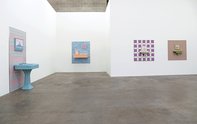
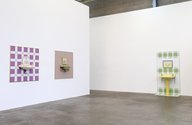
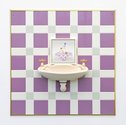
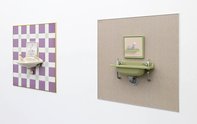

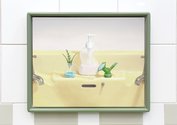

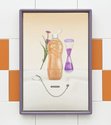


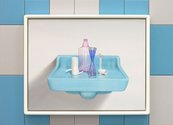
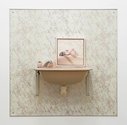
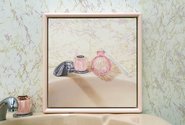
 Advertising in this column
Advertising in this column Two Rooms presents a program of residencies and projects
Two Rooms presents a program of residencies and projects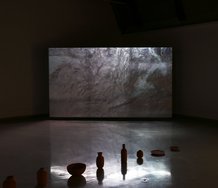
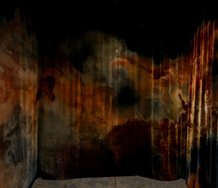
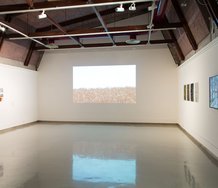
This Discussion has 0 comments.
Comment
Participate
Register to Participate.
Sign in
Sign in to an existing account.